The Night Run Read online
Contents
Chapter One: The Next Morning
Chapter Two: Arrest
Chapter Three: No-one To Help
Chapter Four: The Patrol
Chapter Five: Running for Cover
Chapter Six: Heera
Chapter Seven: Breaking into Jail
Chapter Eight: Fire!
Chapter Nine: Running Into Trouble
Chapter Ten: Kidnapped
Chapter Eleven: Shanti
Chapter Twelve: Night Train
Chapter Thirteen: Finding Dad
Chapter Fourteen: Showdown
Chapter Fifteen: The Next Journey
Chapter One
The Next Morning
Amritsar, Punjab, Northern India
April 10th 1919
My home city, Amritsar, is smouldering. There was a riot overnight – a curfew has been imposed – and now the streets are beginning to come to life again.
Smoke rises from charred buildings, some still burning. I can taste the ashes in my mouth; feel the kerosene fumes stinging my eyes. In a moment, I will leave this place, perhaps forever.
My mother, heavily pregnant, loads the last of our things onto the cart that our neighbour Mr Khan has given us. He’s given us a bullock too, a tall, grey beast with long, curling horns and milky eyes. It will pull us to our new home. Mr Khan looks sad, and his wife is crying. She hugs me tightly and tells me she is sorry. But our troubles aren’t her fault. She is not to blame.
In the distance, I watch another woman walk away. She wears a black shawl and there is purpose in her stride. I wish I could run to her but there is no time. Another storm is coming to take the city – another tragedy caused by humans. We have to be away before it strikes.
Chapter Two
Arrest
I think I should explain.
A day earlier, just after five in the evening, British soldiers took my father. He runs a food stall and is a fine and noble man. His name is Mit Singh, and he is my hero. The soldiers didn’t care about that. They didn’t stop to ask, or to investigate. They simply came, four of them with their rifles, and took my dad away.
We were packing up for the day. My father sells savouries and spiced tea, and each night I hand out leftovers to the poor, who crowd the narrow lanes around the marketplace. My city, Amritsar, is a hectic, noisy, smelly, colourful place. And nowhere is busier than the market. The stalls sell everything from cotton and silk, to birdcages, spices, earthenware pots and fruit. It is the only school I’ve ever known, and it is my favourite place in the world. Or it was – until they took my dad.
When I returned to the stall, I could see something was wrong. Soldiers surrounded my father.
‘I did not riot!’ my dad shouted at them. ‘You are mistaken!’
The lead soldier, a tall Indian with dark, pockmarked skin and a curling black moustache, told my dad to keep quiet.
‘But you have the wrong man!’ my father protested.
The soldier raised his rifle and used the butt to hit my father on the head. My dad fell backwards, crying out in pain, and I felt my stomach churn.
‘Leave him alone!’ I yelled but no one heard me.
The other stallholders had crowded round. Most were friends but none helped my dad. They were too scared. Earlier in the day, rumours had begun of a riot. The rumours were true. People had died and buildings had been burned to the ground. The soldiers were searching for rioters and no one wanted to get in their way. The British ruled India with an iron fist. Anyone who stood against them paid a heavy price.
‘Help him!’ I shouted. ‘Please!’
The lead soldier shook his head.
‘We have witnesses,’ he said. ‘You are a rioter!’
I pushed through the crowd, trying to reach my dad, but two strong, rough hands grabbed me around the shoulders and I was pulled back. It was Atar Khan, one of our neighbours.
‘No, Arjan,’ he warned. ‘Do not make them even angrier, son.’
Hot, salty tears poured down my cheeks. My head felt light. I didn’t care what the soldiers did to me. I wanted to help my dad. I struggled in my neighbour’s grip.
‘You are twelve,’ Mr Khan whispered in my ear. ‘You are not a man. Stop.’
The crowd grew bigger, and people were shouting. ‘Stop the British! Kill the British!’ they screamed.
The soldiers began to panic, their eyes frantic and their foreheads sweaty. I felt my heart surge. Perhaps the crowd would free my dad. But then a whistle sounded and three white men arrived, with batons drawn. Behind them came several policemen.
‘Disperse immediately!’ came the order.
The mob took fright. People began to walk away. I tried to catch sight of my father but it was impossible. Then, as the crowd thinned, I saw the soldiers lift and handcuff him. They led him across the market square and towards the central police station. He turned his face to mine and I saw tears in his eyes. I tried to follow but Mr Khan’s grip was too powerful.
‘No, son!’ he warned again. ‘Come, I will take you home. We must inform your mother.’
I shook my head, as more tears came.
‘What can she do?’ I asked my neighbour. ‘We have to help him now!’
Mr Khan paid no attention. Instead, he led me through a maze of narrow and dark back streets; to the small house I shared with my family. His face was set, his expression full of sorrow. He did not speak until we reached my house.
‘There’s nothing we can do tonight,’ he said. ‘You need to look after your mother. My cousin cooks for the chief of police. I’ll go and speak to him later.’
My mother’s face fell as she opened the door.
‘Mr Khan?’ she asked. ‘What’s the matter? Where is my husband?’
‘There’s been a mistake,’ Mr Khan told her. ‘The British have arrested Arjan’s father. They claim he is a rioter.’
My mum, eight months pregnant, cried out and began to faint. Mr Khan grabbed her and held her steady. ‘Arjan, bring water – quickly!’
As I ran to find the water urn, Mrs Khan appeared. ‘What’s all the noise about?’
The Khans lived in the same yard as us, across the narrow court. They were kind and friendly, their own children now adults. As Mr Khan explained the problem to his wife, I held the cup to my mother’s lips. Her pale brown eyes were wide with fright.
‘We have to help him,’ she whispered to me. ‘If we don’t, the British will kill him.’
The thought made me shudder with fear. I could not imagine a world without my father. I did not want a world without him. Who would teach me how to be a man? Who would look after my mother and my new brother or sister? What would we eat?
Mrs Khan came and sat by my side.
‘Go and secure the gates to the yard,’ she told me. ‘I will look after her.’
I handed the cup over and stood. My legs felt like jelly. Out in the yard, Mr Khan explained what he would do. From the streets, I heard the faint sound of soldiers shouting through loudhailers.
‘The Engrezi have called a curfew,’ Mr Khan told me. ‘No one may leave their houses tonight. The penalty for disobeying will be arrest and jail. Perhaps even death.’
‘Engrezi’ is the word for British in our language, Punjabi. They have ruled my country since long before my birth and they will never leave. At least that’s what I hear the adults say. I have never understood why they rule us. Surely Indians should rule India? It makes no sense – like a fox taking charge over chickens. It is unnatural. But it is the way things are.
‘Tomorrow, at sunrise, I will go to my cousin,’ Mr Khan continued. ‘He will help us.’
He took me in his arms and gave me a hug.
‘Don’t worry, son,’ he said. ‘We will make things right in the mor
ning. For tonight, you need to stay here and take care of your mother.’
I nodded slowly but I couldn’t help thinking about my dad. I had never seen him cry before and it felt wrong. His face, as the soldiers took him, would never leave my memory.
‘We are just across the way,’ my neighbour added. ‘Ask if you need anything at all.’
As Mrs Khan continued to watch my mother, I sat on my mattress and cried.
Chapter Three
No-one To Help
Later, the other neighbours began to return. Six families lived around our rectangular paved courtyard, two on each side and two at the rear. A water pump sat in the middle, and a toilet and wash area near the entrance gate. It was crowded and noisy but it was my home. Now, without my dad, it felt like an entirely different place.
My mum and Mrs Khan were talking and brewing tea, so I went outdoors. Darkness had begun to fall, and in the distance I heard gunshots and shouting. I wondered what was happening.
I saw Lala Ram, another neighbour, whispering to Mr Khan. I sneaked past them and into the latrine, before hiding behind the door. Despite the smell, I stayed put, trying to hear their conversation. There was a crack in the door and I watched them through it. They were talking about my father.
‘There are rumours, brother,’ Lala Ram said to Mr Khan.
Lala had very dark skin and black eyes. He was middle-aged and very skinny, and always rode his bike everywhere. He was a farm hand, working in the fields that surrounded the city. His face was grimy with dust and heat.
‘What rumours?’ Mr Khan asked him.
Lala Ram shook his head, and leant closer.
‘Mit Singh and the others will be taken away from the city,’ he explained.
My heart sank and I felt cold. What did he mean?
‘I saw the postmaster,’ Lala continued. ‘The British have arrested twenty men since the rioting began. The banks have been looted and people killed. Revolutionaries are attacking the police. The city is in turmoil, brother.’
Mr Khan looked shocked.
‘But Mit Singh is innocent!’ he declared. ‘We were at the market all day, together!’
Lala Ram shrugged and when he spoke I saw his teeth in the glow of a kerosene lamp, yellow and rotten from the tobacco he chewed regularly.
‘The Engrezi don’t care,’ he said. ‘They are moving the prisoners on the night train to Lahore. In the morning the prisoners will be taken to court. If found guilty, brother, they will hang for sure!’
My stomach somersaulted and a shiver worked its way across my chest. I felt sick.
‘No, no!’ said Mr Khan. ‘This is an outrage. What will the poor woman do without her husband? Her son is just a child. They will be left destitute!’
Lala Ram shrugged once more.
‘They and many others, brother,’ he said. ‘It is the will of God – what can we do?’
Something dawned on me. A simple, frightening truth. No one would save my father. He would be taken away before sunrise. He would have no escape.
‘I want to go out now,’ Mr Khan said. ‘But how can I risk my own life to save that of Mit Singh?’
Lala Ram nodded.
‘There is nothing we can do,’ he said. ‘Fate will play its own game.’
As the two men walked away, I shook my head. How could this be happening to us? How could I let it happen?
* * *
An hour later, the yard was almost silent. I sat up in bed, and heard my mother breathing gently in her sleep. Over by the simple hearth, I saw a knife, matches and some cold tea. I dressed quickly, drank the tea and took the blade and matches. Tip-toeing across the room, I kissed my mother on her cheek. Her long, chestnut hair fell across her face. She stirred slightly but didn’t wake. I stared at her for a long time.
‘By morning,’ I eventually whispered, ‘you will still have a husband and a son. I swear to you, Mother.’
And then, despite the cold and the fear, I climbed a set of wooden ladders, on to Mr Khan’s dwelling. The gates to our yard were padlocked shut. The only way out was across the rooftops. Somewhere nearby a fox whined and rats shrieked. An amber glow lit the sky to the east, the remnants of the fires started by the rioters.
I took a deep breath and set off to find my father.
Chapter Four
The Patrol
The darkness made my journey across the rooftops slow. I took each step with care. One mistake and I would fall. My breathing was heavy and I was sweating. Every little noise scared me. The clouds above me were deep purple and midnight blue, and the smell of burning filled my nostrils.
I went east, towards the centre of the city. There were only two places my father could be – the police station or the army barracks. If they were sending him away, I guessed the army would have him. They were closest to the railway station. But I decided to check the police cells anyway. It was on my route, and I could have been wrong.
Eventually, some eight alleys from my own house, I dropped down to the street. It was narrow and paved with cobbles, and stank of human waste. I waited in the shadows, listening for any sign of soldiers or policemen. When I heard nothing, I moved on. I couldn’t see a thing and had to feel my way to the main road, using the walls as a guide. The city is home to thousands of rats, and I heard them scurrying about. One slid over my feet as I stepped across an open sewer.
At the main road, I turned right. The street was dark, like the alleyways behind me, but my eyes soon adjusted. I saw nothing and moved on, realising that I had no plan. When I reached the police station, I had had no idea what I would do. Even if they held my father inside, how would I get him out?
My desire to save him had stopped me thinking straight. Now the urgency and determination I’d had at home began to seep away. I had to make a plan, and fast.
The street led to a crossroads, and one of Amritsar’s busiest routes. To my left the road went north, towards Lahore some thirty miles away. To the right were the city and the marketplace. The main road looked deserted but I knew that meant nothing. The British sent out regular patrols and I’d heard many stories of the bandits and evil men who prowled the city late into the night. I had to watch my step.
Instead of the fastest route, I went straight on, hoping to avoid trouble. At the heart of the junction I found a barricade. Tables and chairs had been piled high, as though a bonfire was being built. Underneath was straw and other kindling. The fire hadn’t been lit. I wondered why, as I heard an owl screech somewhere above me.
I entered more narrow streets, each overcrowded with alleys and yards, and housing. The air was cooling but still warm enough to make me sweat.
As I moved, I thought about the police station. It was a big building, with several entrances. The cells were near the rear wall, and underground. The policemen had a wicked reputation. They were evil and many took bribes. Every week, the market traders had stories to tell about people beaten and tortured by the officers. I shuddered as I recalled the tales. I couldn’t bear the thought of my dad being hurt.
Once at the station, I had to check the cells somehow. But how would I get inside? I decided that I would need a distraction – something to send the officers elsewhere, as I sneaked into the back entrance. But I had no idea what that diversion would be.
I went through possibilities in my head as I approached an orphanage. It was weird seeing the city so empty. I’d only ever known Amritsar to be busy, but then I’d never been out so late before. The sounds I was used to during the day were missing, and the atmosphere was eerie. It felt wrong. Then, as I was deciding which way to go, I heard them.
Soldiers.
Panicked and scared, I jumped the wall of the orphanage. The grounds to the back were open and led across some common land into another maze of streets. If I had to, I could run that way. I crouched by the wall first, however, waiting for the patrol to pass by. I could hear their boots as they walked. When I sneaked a look, I saw three of them, with rifles on their shoulders and cigarettes han
ging from their mouths. Each wore a red turban and khaki uniform. Each looked bored, too.
‘This is a waste of time,’ said one, as they walked past my hiding place. ‘No one will be out tonight. They aren’t stupid.’
‘Vigilance,’ said a second, in a tone that said he was the leader. ‘We must remain on the look-out. The revolutionaries use the darkness to move around.’
‘If I see one,’ the first replied, ‘I’ll shoot him on sight. There’s no danger.’
The soldiers laughed and one of them started to cough. I felt something near my hand, and my heart began to pound. Fur and feet and…
‘Ow!’ I screamed as a rat bit one of my fingers.
The soldiers stopped. I jumped up and ran, desperate to get away.
‘There!’ yelled one of the soldiers. ‘We have our first criminal!’
I heard them climb over the wall and start the chase. My heart raced as I ran. I was in desperate trouble.
Chapter Five
Running for Cover
Iran for the common behind the orphanage. The ground was uneven and overgrown with weeds. In the darkness, and in my haste, I had no way of knowing where the potholes and divots were. Two open sewers crossed the common – I hoped I wouldn’t fall into one. I could hear the soldiers behind me, swearing and shouting, and I prayed they wouldn’t try to shoot me.
As I ran, dogs began to bark somewhere nearby. They were almost as scary as the soldiers. Most were wild and roamed in packs at night, attacking the unwary. But I didn’t have time to think about them. Not yet. The soldiers were falling behind and I needed to find a hiding place quickly.
Buildings surrounded the common. The only way out was through one of the many exit gates. Most of these would be locked but at the far end, the walls had foot- and handholds, where blocks had been removed. I had often seen people use these to scale up to the rooftops. That was my aim – to lose the soldiers and move on. The barking grew closer and then I heard a gunshot.

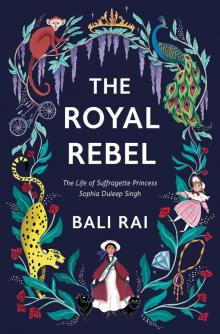 The Royal Rebel
The Royal Rebel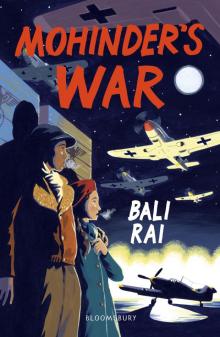 Mohinder's War
Mohinder's War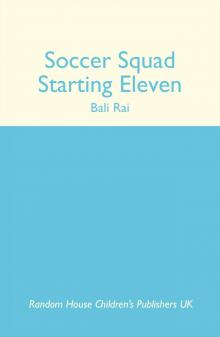 Starting Eleven
Starting Eleven Glory!
Glory!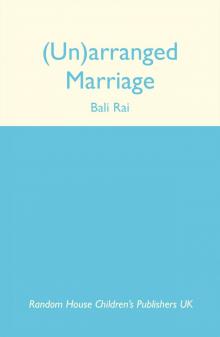 (Un)arranged Marriage
(Un)arranged Marriage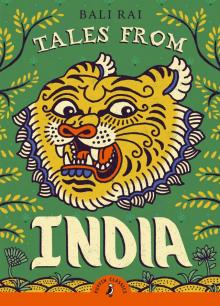 Tales from India
Tales from India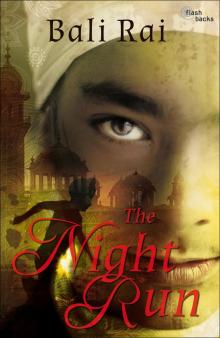 The Night Run
The Night Run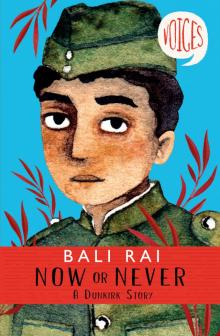 Voices: Now or Never
Voices: Now or Never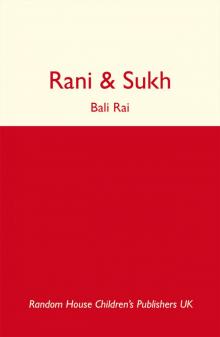 Rani and Sukh
Rani and Sukh Stars!
Stars!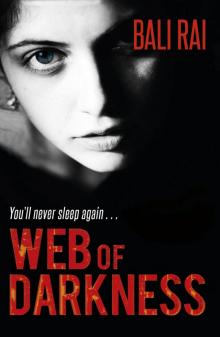 Web of Darkness
Web of Darkness The Crew
The Crew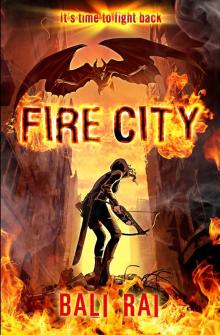 Fire City
Fire City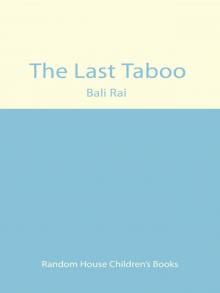 The Last Taboo
The Last Taboo